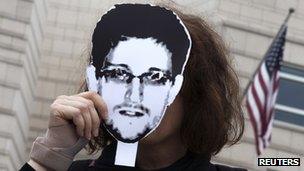NSA: White House task force recommends surveillance curbs
- Published
- comments
Former NSA director Hayden analyses the panel's report in an interview with the BBC's Katty Kay
A White House panel has recommended significant curbs on the National Security Agency's sweeping electronic surveillance programmes.
Among its 46 recommendations, the five-member panel said the NSA should cease storing vast amounts of data on calls processed by US phone companies.
Details of the snooping programme were leaked by ex-NSA contractor Edward Snowden, now a fugitive in Russia.
The review, external comes after a federal judge found the programme unconstitutional.
'Public trust' needed
In its 308-page report, the Review Group on Intelligence and Communications Technology recommended the secret Foreign Intelligence Surveillance Court (FISC), a federal court that handles sensitive national security cases, only authorise the collection of phone data when it was related to a specific international terrorism investigation and was "reasonable" in scope and breadth.
The data should no longer be stored wholesale by the NSA, the panel recommended, instead remaining in the custody of the phone company or a third party.
It also suggested limits on national security letters, which are legal orders giving the government authority to demand financial and phone records without prior court approval. It recommended intelligence agencies obtain a prior "judicial finding" showing "reasonable grounds" that the information sought is relevant.

Edward Snowden's leaks have generated a debate about how far surveillance should go
President Barack Obama convened the panel in August after Mr Snowden began releasing a trove of internal NSA documents to the news media, bringing highly sensitive electronic intelligence programmes to light for the first time and prompting an international outcry over alleged violations of privacy.
Among its recommendations:
The NSA director should be confirmed by the US Senate, with civilians eligible for the role
The president should give "serious consideration" to ensuring the next NSA director is a civilian and separate the position from US Cyber Command, a military unit
Creation of a Public Interest Advocate to argue in favour of privacy and civil liberties interests before the FISC
More transparency at FISC
Halting spy agencies' efforts to undermine commercial encryption methods
Limits on who can access information gained by the NSA
The president should personally approve all methods used by the intelligence community, including spying on foreign leaders
It is unclear how many of the panel's suggestions, which intelligence officials are likely to oppose vigorously, will be accepted by the Obama administration.
Former NSA director Michael Hayden told the BBC the report's recommendations would complicate the task of intelligence collection.
"Making this more public will shave points off operational effectiveness," he said about the NSA programmes. "But... my personal formula in this is if we don't do that it won't matter because the American people won't let us do it in the first place."
'Respecting privacy'
Lawyer David Rivkin and Glenn Greenwald, the former Guardian columnist, put their arguments forward to Newsnight's Jeremy Paxman
Mr Obama met the review panel earlier on Wednesday.
In a statement, the White House said Mr Obama told its members that "the United States use its intelligence collection capabilities in a way that optimally protects our national security while supporting our foreign policy, respecting privacy and civil liberties, maintaining the public trust, and reducing the risk of unauthorized disclosure".
The panel was comprised of Richard Clarke, a former White House counter-terrorism adviser; Michael Morell, the former deputy director of the CIA; University of Chicago law professor Geoffrey Stone; former White House technical adviser Cass Sunstein; and Peter Swire, an expert in privacy law.
On Monday, a federal court in Washington DC found the NSA's mass collection of Americans' phone call information was unconstitutional, in a case expected to reach the US Supreme Court.
Judge Richard Leon called the surveillance programme "indiscriminate" and an "almost Orwellian technology that enables the government to store and analyze the phone metadata of every telephone user in the United States".